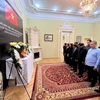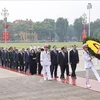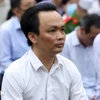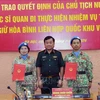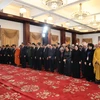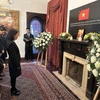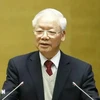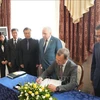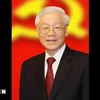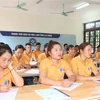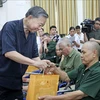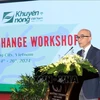General Director of the Overseas Labour Management Department under the Ministry of Labour, Invalids and Social Affairs (MOLISA) Nguyen Ngoc Quynh spoke with the Vietnam Business Forum about how Vietnamese workers, businesses and managers should approach the Japanese market which is considered big but highly demanding.
According to Quynh, in 2013 the Japanese market received some 10,000 Vietnamese trainees. The demand of Japanese businesses is diversified mostly in construction, mechanics, food processing, fisheries, etc.
*What does the Japanese labour market attract to Vietnamese labourers ?
Japan is regarded as a potential market for Vietnam in terms of both labour demand and wages.
In recent years, Japanese demand for Vietnamese workers has increased sharply. It is also more diverse, from technical industry to agriculture, electronics assembly, food processing, interior decoration, and others.
The demand is huge but depends on the negotiating ability of Vietnamese businesses. Vietnam has recently succeeded in sending medical workers to get further training and work in Japan. This is a good news for Vietnam and its workers.
*Then, under what form does the Japanese market receive Vietnamese workers?
Japan does not accept foreign workers with low professionalism, but trainees with good professional skills. Vietnam started sending trainees to Japan in 1992. However, due to high percentage of labour contract violations, the figure decreased to some 3,000 trainees a year.
After the issuance of Decree 141/2005/ND-CP on management of Vietnamese guest workers (later becoming a law), MOLISA has improved recruitment, training and management works. Contract violations dropped from 30 percent to some 2 percent. As a result of it, the number of trainees has increased each year.
Vietnam has cooperated with IMM Japan (Japanese SME international human resources development organisation) to provide trainees with necessary skills to work in Japan.This free of charge programme has helped the target group in disadvantaged Vietnamese provinces to get training in Japan on technology with high sense of work discipline.
*Can Vietnamese labourers meet Japan's labour skill requirements ?
As mentioned above, Japan does not accept foreign workers of low professionalism, but provides training for guest workers coming from developing countries including Vietnam. In fact, many Japanese companies have already employed Vietnamese workers and are very pleased with them. They have especially appreciated Vietnamese guest workers for their hard-working, and learning willingness. Still, there are some cases of poor discipline and low capacity.
*Then, what should Vietnamese workers, businesses and managers do to promote labour export to Japan?
The door is open for Vietnamese workers to work in the attractive Japanese market. However, the highly demanding labour market requires strict conditions. Professional training is the key to be able to enter the Japanese labour market. We must enhance the selection of trainees to meet requirements of Japanese partners, and avoid negative consequences that may cause losses in terms of both finance and reputation.
Secondly, Vietnamese businesses must have good strategies and invest in human capital. Vietnamese guest workers need to be provided with soft skills to work overseas. Developing good relationship with reliable Japanese counterparts is also vital for doing business in Japan.
Besides this, Vietnamese authorities need to persuade Japanese side to extend training time for trainees, take strong measures against the illegal use of foreign workers in Japan, as well as dealing with Vietnamese guest workers refusing to return home after their work contracts expire.-VNA
According to Quynh, in 2013 the Japanese market received some 10,000 Vietnamese trainees. The demand of Japanese businesses is diversified mostly in construction, mechanics, food processing, fisheries, etc.
*What does the Japanese labour market attract to Vietnamese labourers ?
Japan is regarded as a potential market for Vietnam in terms of both labour demand and wages.
In recent years, Japanese demand for Vietnamese workers has increased sharply. It is also more diverse, from technical industry to agriculture, electronics assembly, food processing, interior decoration, and others.
The demand is huge but depends on the negotiating ability of Vietnamese businesses. Vietnam has recently succeeded in sending medical workers to get further training and work in Japan. This is a good news for Vietnam and its workers.
*Then, under what form does the Japanese market receive Vietnamese workers?
Japan does not accept foreign workers with low professionalism, but trainees with good professional skills. Vietnam started sending trainees to Japan in 1992. However, due to high percentage of labour contract violations, the figure decreased to some 3,000 trainees a year.
After the issuance of Decree 141/2005/ND-CP on management of Vietnamese guest workers (later becoming a law), MOLISA has improved recruitment, training and management works. Contract violations dropped from 30 percent to some 2 percent. As a result of it, the number of trainees has increased each year.
Vietnam has cooperated with IMM Japan (Japanese SME international human resources development organisation) to provide trainees with necessary skills to work in Japan.This free of charge programme has helped the target group in disadvantaged Vietnamese provinces to get training in Japan on technology with high sense of work discipline.
*Can Vietnamese labourers meet Japan's labour skill requirements ?
As mentioned above, Japan does not accept foreign workers of low professionalism, but provides training for guest workers coming from developing countries including Vietnam. In fact, many Japanese companies have already employed Vietnamese workers and are very pleased with them. They have especially appreciated Vietnamese guest workers for their hard-working, and learning willingness. Still, there are some cases of poor discipline and low capacity.
*Then, what should Vietnamese workers, businesses and managers do to promote labour export to Japan?
The door is open for Vietnamese workers to work in the attractive Japanese market. However, the highly demanding labour market requires strict conditions. Professional training is the key to be able to enter the Japanese labour market. We must enhance the selection of trainees to meet requirements of Japanese partners, and avoid negative consequences that may cause losses in terms of both finance and reputation.
Secondly, Vietnamese businesses must have good strategies and invest in human capital. Vietnamese guest workers need to be provided with soft skills to work overseas. Developing good relationship with reliable Japanese counterparts is also vital for doing business in Japan.
Besides this, Vietnamese authorities need to persuade Japanese side to extend training time for trainees, take strong measures against the illegal use of foreign workers in Japan, as well as dealing with Vietnamese guest workers refusing to return home after their work contracts expire.-VNA
